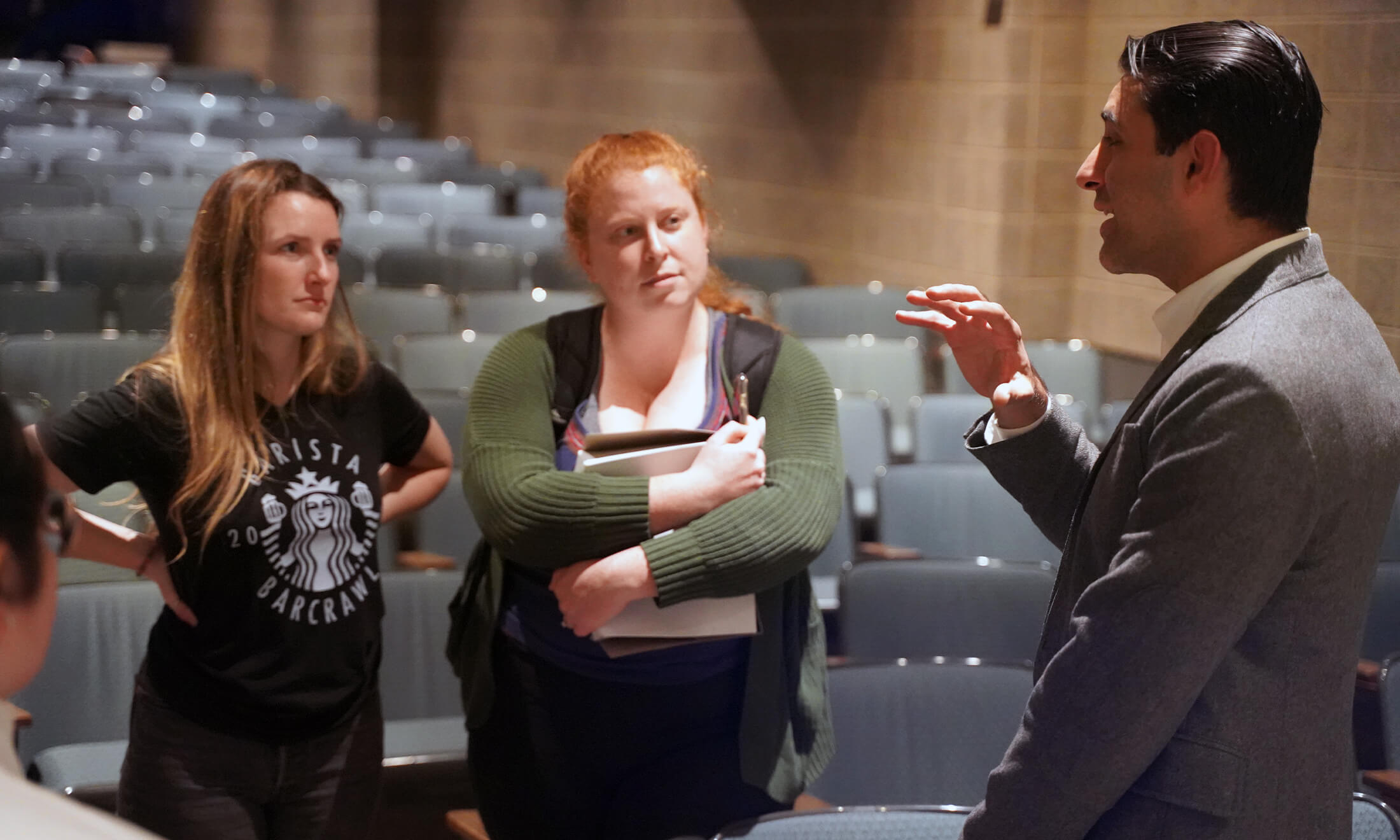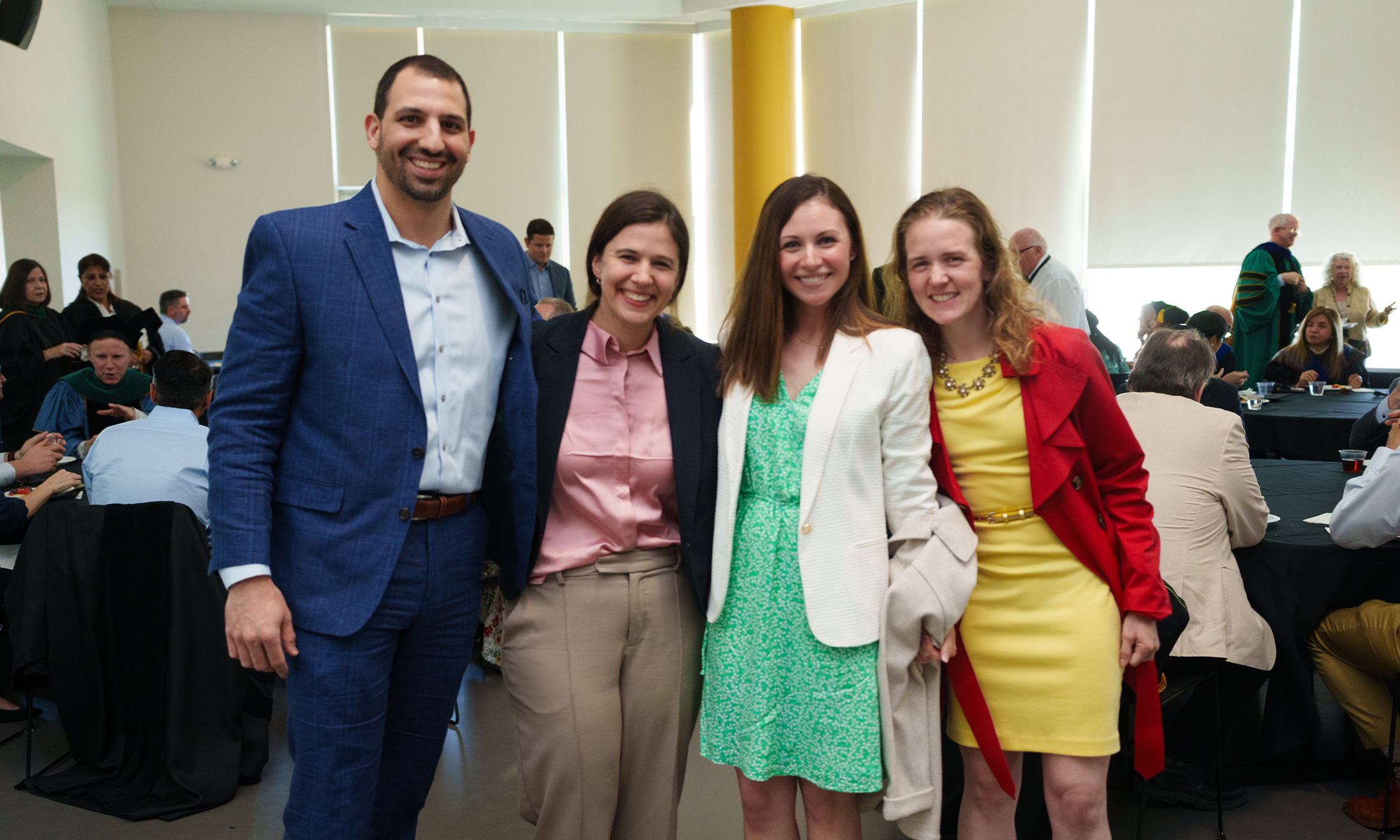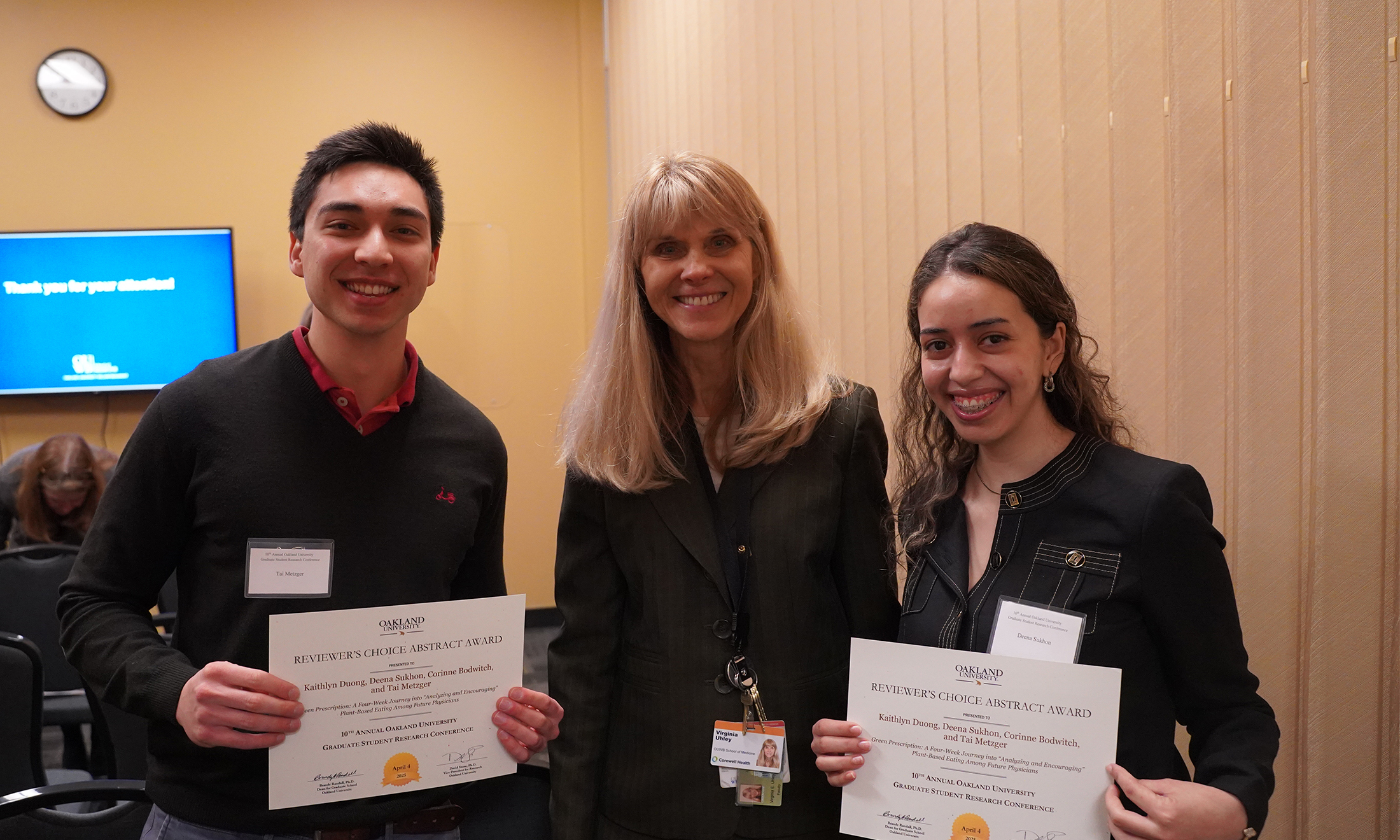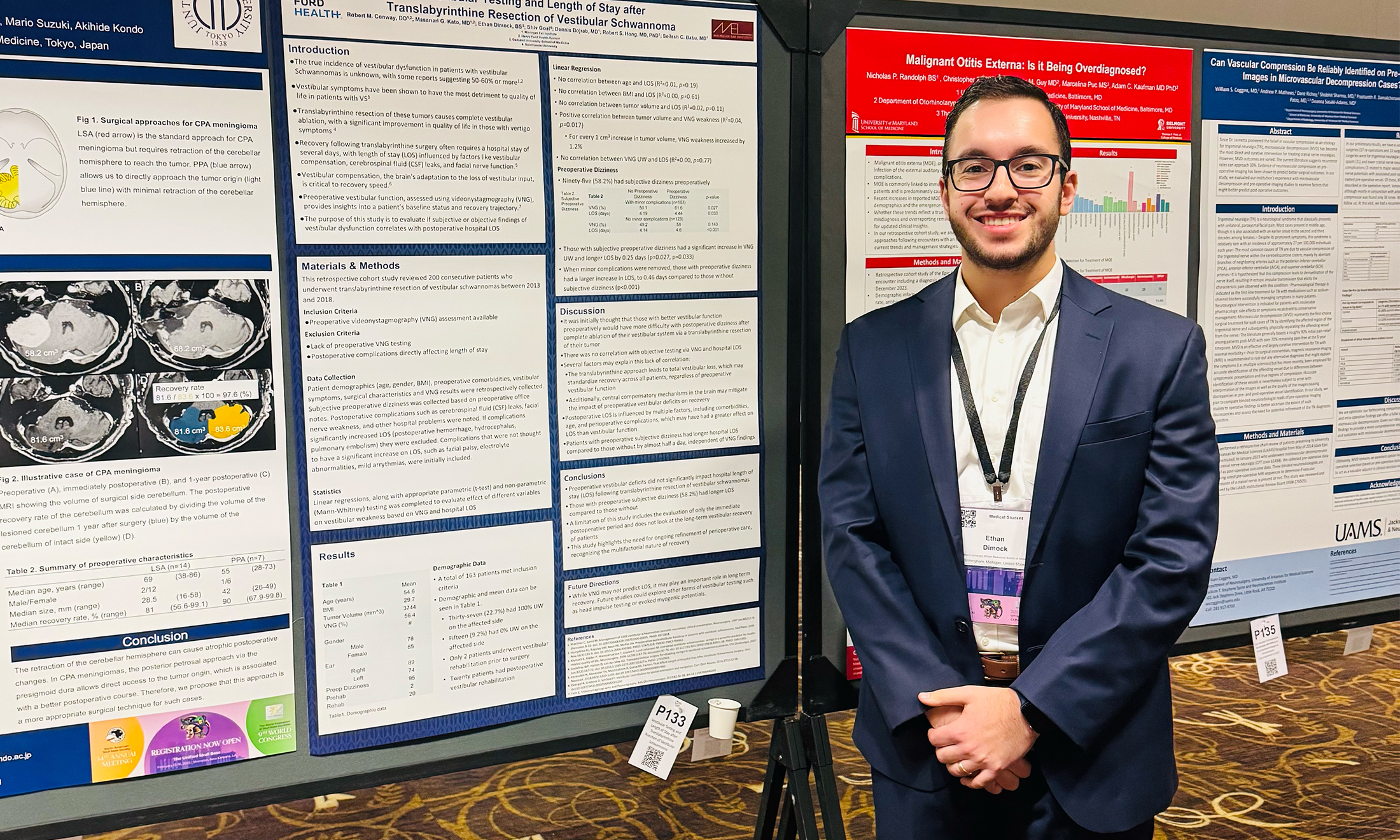‘Right here, right now’
OUWB charter class member talks to M3s about their potential impact on global health
Medical students can make all the difference in the world — literally — by opting for nontraditional career paths that might take them to unique locations where their services are especially needed.
That’s according to an alum of Oakland University William Beaumont School of Medicine who recently returned to speak to third-year medical students.
Saad Sahi, M.D., OUWB ’15, presented, “Meaning, Purpose, and Global Perspective” — a topic he is well-versed in due to his experiences since graduating from OUWB’s first class.
In 2023, he completed training as a surgery fellow at University of California – San Francisco, where he was stationed at a Navajo Nation hospital in New Mexico, and then a health care center in Uganda.
Further, he recently started a two-year clinical fellowship in acute care surgery at Brigham & Women’s Hospital in Boston.
“So much of what I do started here at OUWB,” Sahi said after his presentation. “It was a very full circle moment…knowing that I sat in these same seats, and I’ve been able to do everything I’ve wanted to do and that it is possible.”
‘That’s what I wanted to do’
Sahi was born in Pakistan and said he lived in six different countries including Saudi Arabia, Holland, Canada, and Italy before moving to the U.S. at 15 to attend the Loomis Chaffee boarding school in Connecticut.
He called it a surreal experience to attend a school with descendants of the Rockefellers and play soccer with soccer balls made at the factory where his uncles worked in Pakistan.
“It was a lot to make sense of as a 15-year-old kid,” said Sahi.
Making sense of things would become a driving force in his life, starting in college, when he earned a bachelor’s degree in philosophy at Northeastern University in Boston.
It was during his last year at Northeastern when he was walking across campus and handed a flyer for a screening for a documentary about Doctors Without Borders.
“I remember walking out of there thinking that’s what I wanted to do,” he said. “I saw myself in that documentary.”
In 2011, Sahi began attending OUWB, where he said he had “the experience of a lifetime.”
It included a kind of epiphany when he was working on his Embark project on how to incorporate a global health perspective into medical education.
Specifically, he learned about the Copenhagen Consensus, a project that seeks to establish priorities for advancing global welfare using methodologies based on the theory of welfare economics, through cost-benefit analysis.
Among the top priorities, he learned, was strengthening surgical capacities.
“That’s when I realized that this doesn’t just matter to me…it matters to all of us,” he said. “I realized that there was something I could do surgically, especially since I had been interested in surgery since I started medical school.”
‘Changed everything for me’
In 2015, Sahi was matched at University of Texas at Austin Dell Medical School. His specialty was general surgery.
There weren’t any global aspects to his residency, but his commitment to working in global health never wavered.
“In fact, my residency program thought it was a little crazy for wanting to do global health as a career,” he said.
Around the same time, three big reports were published that impacted views on surgery around the world.
In 2015, the World Health Organization’s World Health Assembly (WHA) addressed the need for surgery through resolution WHA68.15, “Strengthening emergency and essential surgical care and anesthesia as a component of universal health coverage.” It was the 68th WHA, but the first time surgery had been directly addressed by the WHA.
Also in 2015, the World Bank published the third edition of “Disease Control Priorities in Developing Countries” highlighting cost-effective interventions based on analysis of health systems and more. Funded by the Bill and Melinda Gates Foundation, it contained nine volumes. The first volume was “Essential Surgery.” It was the first time surgery had been identified as a top priority in the Disease Control Priorities.
The third big event that happened around that time was publication of “The Lancet Commission on Global Surgery.” Sahi said the massive report was done by multiple academic institutions from 30 countries across the world to essentially determine what was going on globally in terms of surgical care. Sahi said the findings were “alarming.”
“Number one, 5 billion people (globally) do not have access to safe, affordable surgical care or anesthesia care when they need it,” he said. “Number two, 313 million surgeries are done around the world every year. Only 6% of them happen in low-income countries. That’s astonishing.”
“When I saw that number, it changed everything for me,” he added.
When he finished his five-year residency in 2020, he didn’t have a job lined up.
That is, until he met people from the University of California San Francisco and learned about the school’s global health initiatives.
‘Not that far removed’
Through a clinical fellowship, Sahi was involved with the UCSF Health, Equity, Action, and Leadership (HEAL) initiative. HEAL is a multi-disciplinary global health fellowship program founded on the principles of equity, justice, and solidarity.
He went to a hospital in Shiprock, New Mexico and served as a surgeon at the Northern Navajo Medical Center.
Sahi spent the second year of his fellowship at the Mbale Regional Referral Hospital in Uganda. He extended his fellowship one year, spending the first three months at Gallup Indian Medical Center in Gallup, New Mexico, followed by nine months back at Mbale.
Last summer, he started a two-year clinical fellowship in acute care surgery at Brigham & Women’s Hospital.
During his presentation last year to the OUWB M3s, Sahi highlighted several points of pride about his work thus far.
In Uganda, for example, he was part of the team that installed a camera over an operating table so residents could watch and learn. Using OUWB’s Robert J. Lucas Society as an example, he started an interest group there similarly focused on surgery. And a pipeline of mentorships was created to help get more medical students in the region interested in surgery. (Most want to focus on infectious disease, he said.)
Further, he helped start a local coffee shop and restaurant where 50% of the profits go toward paying resident tuition fees.
He also was proud of the fact that UCSF will graduate 20 more surgeons in the next five years through its Uganda efforts.
But, he said, a lot of work remains.
There is strong demand for surgeons in such places that he called “grossly understaffed.” Uganda, for example, has a population of about 45 million but only 185 surgeons.
Further, there is high demand for women surgeons. He pointed to Ethiopia as an example — a country where there are 370 surgeons, but only eight of them are women.
“There’s strong data that suggests patients have better outcomes when they receive care from communities and providers that reflect their own demographic,” said Sahi.
There is also a strong need for supplies.
“In about 86% of the world, you show up to the hospital in an emergency and we tell the family members to go buy the sutures, the gloves, the antibiotics, and bring it back,” he said. “If you can’t afford it, you die.”
Sahi said he knows what it feels like to be affected by such conditions, because that’s exactly why his grandfather died.
“This is not that far removed from any of you,” Sahi told the M3s.
‘Right here, right now’
When he concluded his presentation, Sahi said that he hopes the students “really take the time to consider what’s meaningful” when considering career paths.
“What do you love? What does the world need? What can you be paid for? What are you good at?” he asked. “If you can find that sweet spot right in the middle of all of those, then you’re good.”
Berkley Browne, Ph.D., associate dean for student affairs, said such advice was exactly why Sahi was a good fit for M3s headed into their last year of medical education and on the cusp of finalizing what specialty they will go into. (His presentation was through the school’s PRISM program that is a multi-layered system of support, along with a four-year curriculum that focuses on personal growth, wellness, and career development.)
“We wanted to end the year giving students the opportunity to think hard about their purpose as future physicians,” she said. “What’s going to give them meaning, and with a focus toward equity on a global scale?”
She called it “powerful” for the students to hear such a message from someone who was in their shoes not too long ago.
Sahi said, if nothing else, there’s one big thing he hoped students took away from his presentation.
“It’s remarkable what we can do on a global level to take care of each other, and you can start anywhere…. including right here, right now.”
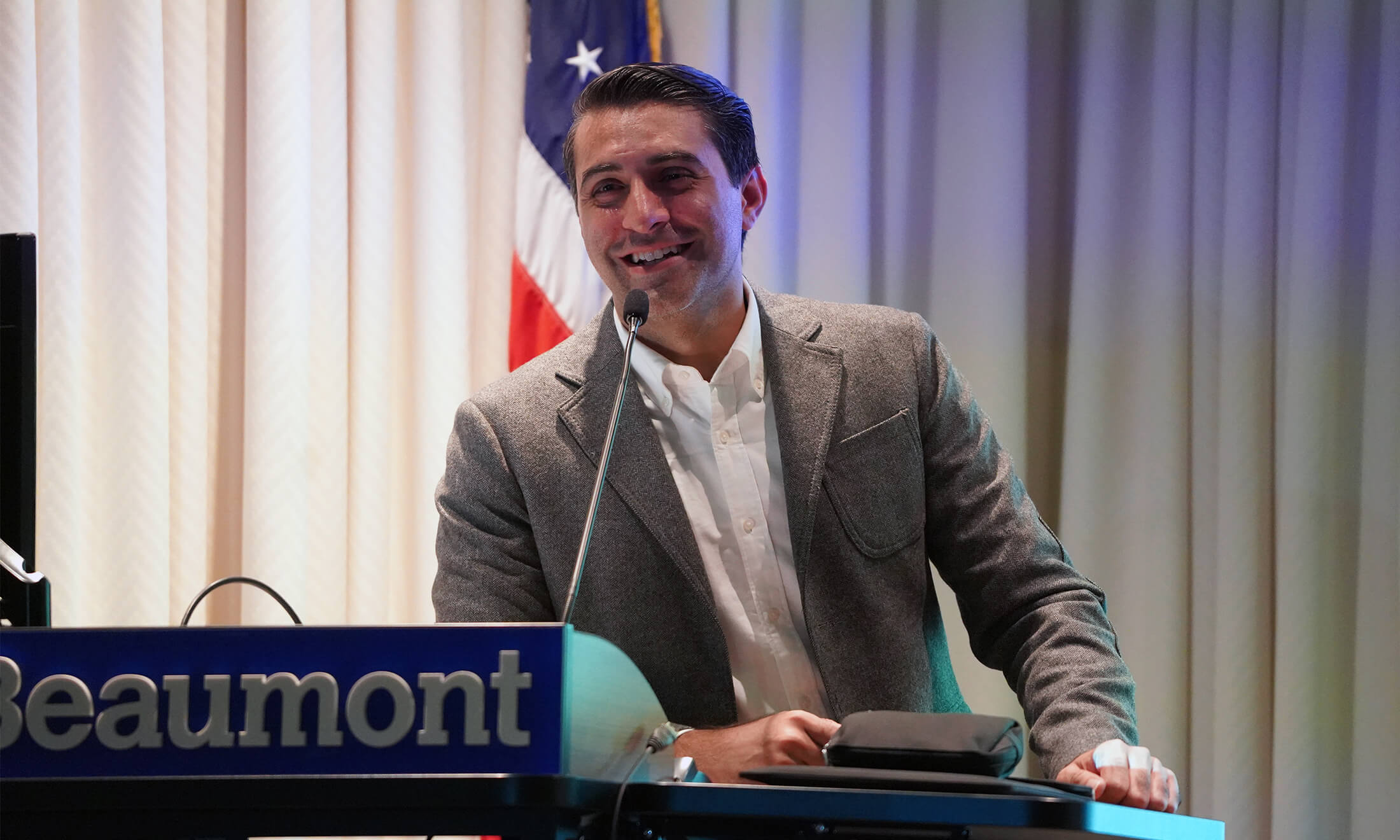
 February 01, 2024
February 01, 2024
 By Andrew Dietderich
By Andrew Dietderich